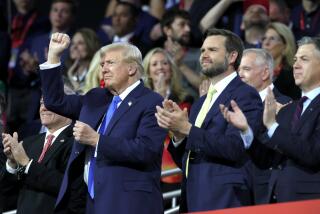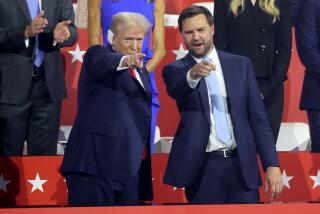GOP candidates try to refocus
- Share via
Reporting from Hooksett, N.H. — Knocked off-course by Donald Trump and talk of President Obama’s birth certificate, the 2012 Republican contenders are trying to refocus the campaign on voter worries that are dragging down the president’s popularity: rising gas prices and a slow economic recovery.
Mitt Romney made the point at a multi-candidate forum here this weekend, saying Obama’s policies deepened a three-year slump that left 20 million people jobless or underemployed. Many Americans “don’t know how they can make ends meet, because of the cost of gasoline and the higher cost of food. It is simply inexcusable,” Romney said.
Yet the Republican field faces other problems. Questions continue to swirl about who exactly is running, and polls show many Republican voters aren’t satisfied with the current field. While something of a quadrennial complaint, such discontent is surfacing even as Republicans prepare for the campaign’s first debate, this week in South Carolina.
“There is no passion out there for anybody,” said Curt Anderson, a Republican strategist not aligned with any candidate. “Maybe that will change. But it’s a little bit odd and maybe a little bit disconcerting at this point.”
In recent weeks, celebrity developer Trump has overshadowed more-conventional contenders with antics that threatened to make the Republican contest look trivial and threw the party off-message.
Trump tormented the GOP establishment with his “birther” talk — even if some found merit in his message, particularly his tough talk about China and its impact on the American economy. “I’d drop a 25% tax” on imports from China, Trump said in Nevada, punctuating that message with profanity.
Whatever the utility of the message, Trump underscored uncertainty about who is running and who isn’t. Prominent faces from the last campaign, former governors Mike Huckabee of Arkansas and Sarah Palin of Alaska, continue to dangle the possibility of a 2012 try while doing little to prove that they’re about to run.
New faces also arose last week, including Jon Huntsman Jr., a former Utah governor just returned from a stint as U.S. ambassador to China, and Indiana Gov. Mitch Daniels, an establishment favorite. Daniels’ approval late last week of a state measure to cut off all government funding for Planned Parenthood — after having drawn conservative fire earlier for saying the party needed a “truce” on social issues — has renewed speculation that he may run.
Only candidates who have taken formal steps to declare candidacy can take part in Thursday’s debate in Greenville, S.C., co-sponsored by Fox News and the state Republican Party. Former Minnesota Gov. Tim Pawlenty, former Pennsylvania Sen. Rick Santorum and Rep. Ron Paul of Texas have committed. Four years ago this month, by comparison, 10 men (there were no women in the 2008 GOP primaries) took part in a pair of TV debates.
Doubts about the electability of the current crop of candidates was a frequent topic in interviews with politicians and activists in New Hampshire over the last few days, and a source of defensiveness at multi-candidate events in Manchester, the state’s largest city.
Different speakers, representing the “tea party” organizations that sponsored two forums, tried to knock down what they said were false perceptions about the weakness of the field. But voters like Gary Lemay, who supported John McCain in 2008, signaled dissatisfaction. The 57-year-old from Laconia, N.H., said he disliked “career, party politicians” and was drawn to Trump, despite his “crazy” ideas, because “he’s going to say it like it is.”
Past Republican candidates, such as conservative commentator Pat Buchanan, have also used high-octane populist messages to tap into similar anger — winning primaries, though not the nomination.
One potential contender successfully mining those emotions this spring is Rep. Michele Bachmann, who brought the crowd to its feet Saturday at a tea party rally on the University of Southern New Hampshire campus with a vow to make Obama a one-term president.
But the Minnesota congresswoman, expected to reveal her 2012 decision shortly, marred an attack on Obama’s energy policies with a highly exaggerated claim that “we have more oil in the United States in three states than all of Saudi Arabia.” According to the U.S. Energy Information Administration, the supply of crude oil in Saudi Arabia represents one-fifth the world’s proven reserves, or more than 10 times the amount in the U.S.
Bachmann aides said she was relying on a Heritage Foundation study that cited federal estimates of shale oil reserves.
Freshman Sen. Rand Paul of Kentucky, a tea party lawmaker and the son of Ron Paul, told reporters in Concord that all the GOP contenders “have obstacles to overcome.”
He said Romney’s backing for a law that requires Massachusetts citizens to purchase health insurance threatens to undermine the Republican attack on Obama’s healthcare program, which contains a similar mandate.
“I think it will make it more difficult” to defeat Obama if Romney is the nominee, said Paul, who spent three days in New Hampshire raising money for local Republicans.
Romney defended the healthcare law when questioned about it at the Friday night forum, but said some parts hadn’t worked.
“It’s not perfect,” he said, but better than Obama’s “one-size-fits-all plan,” which he promised to repeal if elected.
Romney wasn’t quite ready to drop the topic some Republicans would like to put behind them. Attempting a light moment, he told the crowd that Obama “finally produced a long-form birth certificate and, you know, there was no one more disappointed than that amiable, know-it-all windbag — Joe Biden.”
The joke largely fell flat, and a Romney supporter felt compelled to explain that the intended target had been Trump.
More to Read
Get the L.A. Times Politics newsletter
Deeply reported insights into legislation, politics and policy from Sacramento, Washington and beyond. In your inbox twice per week.
You may occasionally receive promotional content from the Los Angeles Times.








